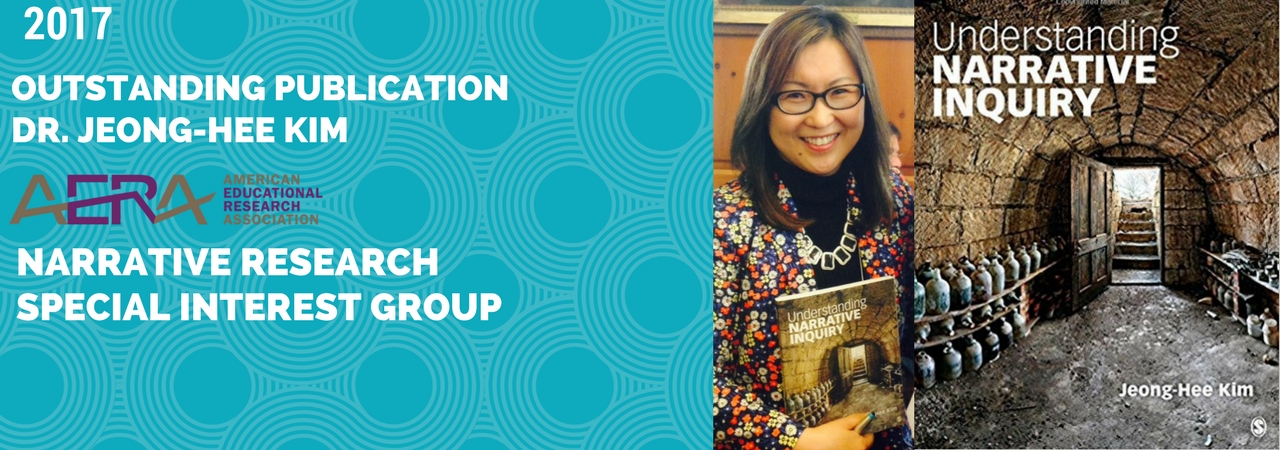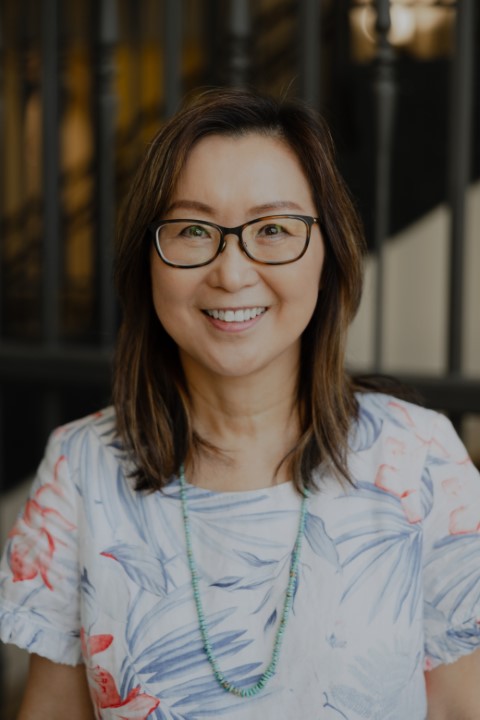Jeong-Hee Kim, Ph.D.
Email: jeong-hee.kim@ttu.edu
Phone: 806-834-6075
Office: Education 104A
Jeong-Hee Kim is a Professor of Curriculum Studies and Teacher Education in the Department of Curriculum and Instruction. As a curriculum theorist, teacher educator, and narrative inquiry methodologist, Kim’s research explores various onto-epistemological underpinnings of curriculum studies, with a particular focus on the philosophical concept of Bildung, an edifying way of developing and cultivating self for the better. Kim is actively involved in interdisciplinary curriculum making, bridging the field of curriculum studies with other disciplines, such as engineering and medical education, to reimagine what it means to be human in the posthuman era. She is an award-winning author, having received the 2017 AERA Outstanding Publication Award for her book, Understanding Narrative Inquiry (2016, Sage), which has also been translated into Chinese. Kim served as a co-Principal Investigator on an NSF Innovations in Graduate Education (IGE) grant, awarded in 2018, for a five-year interdisciplinary project aimed at developing an innovative graduate engineering curriculum, in collaboration with faculty from engineering, psychology, and studio art. After serving as Department Chair from 2020 to 2024, Kim is currently working on her new book, Who Is Afraid of Theory?: Understanding Philosophical/Theoretical Frameworks in the Social Sciences with Sage.
https://us.sagepub.com/en-us/nam/understanding-narrative-inquiry/book240868#description


Education
- PhD in Curriculum Studies, Arizona State University
- MA in Teaching English to Speakers of Other Language (TESOL), Arizona State University
- TESOL Certificate. Queensland University, Brisbane, Australia
Areas of Expertise
- Curriculum Theory
- Narrative Inquiry
- Philosophical Notion of Bildung
- Teacher Action Research
- Interdisciplinary Research Focusing on Engineering Education
- Posthuman Understanding of One-Health, Sustainability, and Biodiversity
Selected Publications
Books
Kim, J. H. (Under Contract). Who’s Afraid of Theory?: Philosophical/Theoretical Frameworks in the Social Sciences with Sage.
Kim, J. H. (2018). Understanding Narrative Inquiry: The Crafting and Analysis of Stories as Research. Chinese Edition, Psychological Publishing Co. 430 pages.
Kim, J. H. (2016). Understanding Narrative Inquiry: The Crafting and Analysis of Stories as Research. Thousand Oaks, CA: SAGE. 360 pages. (Received the AERA 2017 Outstanding Publication Award)
Related Interviews:
http://www.depts.ttu.edu/vpr/focus/posts/2017/jeong-hee-kim-publication-award.php
http://www.methodspace.com/telling-story-narrative-inquiry-value/
Kim, J. H., Morales, A., Earl, R., & Avalos, S. (2016). Being the “First”: A narrative inquiry into the funds of knowledge of first generation college students in teacher education. New Prairie Press eBooks. Available at http://newprairiepress.org/ebooks/7
Peer Reviewed Journal Articles and Book Chapters
(* Denotes student author at the time of publication)
Leiss, J. & Kim, J. H. (2022). Against sedentary school environment: Rethinking the aims of education through physical education. The Journal of Educational Research, 115(2), 111-121.
Cho, J., & Kim, J. H. (2022). Compassionate anger as a mobilizer for social justice: feelings application in curriculum design. Journal of Curriculum Studies, 54(4), pp. 466-485.
Kim, J. H., *Nguyen, N., Campbell, R., Yoo, S., Taraban, R., & Reible, D. (2021). Developing reflective engineers through an arts-incorporated graduate course: A curriculum inquiry. Thinking Skills and Creativity, 42, 1-18, 100909.
DeLucia, P., Woods, A., Kim, J. H., *Nguyen, N., Wang, E., & Yang, J. (2021). Learning to become researchers: Lessons learned from a research experience for undergraduates (REU) program focused on research in psychological sciences with real-world implications. Scholarship and Practice of Undergraduate Research (SPUR), 4(3), 10-22.
Kim, J. H., Cruz, J., Hite, R., Dwyer, J., Gottlieb, J., Greenhalgh-Spencer, H., Park, M., Smit, J., Smith, P., & Zimmerman, A. (2020). Affective writing as a promise of “yet-to-become”: Unearthing the meaning of writing through the voice of tenure-track assistant professors. Taboo: The Journal of Culture and Education, 19(5), 103-119.
*Morrison, J. A., & Kim, J. H. (2020). Resisting the “Tyranny of an Expert”: A Journey Towards Relational Research. In A. Zimmerman (Ed.), Preparing Students for Community-Engaged Scholarship in Higher Education (pp. 43-60). Hershey, PA: IGI Global. doi:10.4018/978-1-7998-2208-0.ch003.
Kim, J. H., *Morrison, J. A., & *Ramzinski, E. (2019). Is Bildung possible in the classroom?: An exploration of autobiographical writing as philosophical exercise (askēsis) for developing one’s Bildung. Journal of Curriculum and Pedagogy, 16(3), 242-262. (DOI: 10.1080/15505170.2019.1581676) (Acceptance Rate: 18%).
Kim, J. H., & So, K. (2018) Understanding the “Other”: Rethinking multicultural education in South Korea through Gadamer’s Philosophical Hermeneutics. International Journal of Multicultural Education, 21(1), 102-117. (SCOPUS)
Bhattacharya, K. & Kim, J. H. (2018). Reworking prejudice in qualitative inquiry with Gadamer and De/colonizing onto-epistemologies. Qualitative Inquiry. (Acceptance Rate: 10%, SSCI).
Zimmerman, A. S., & Kim, J. H. (2018). Storytelling as an invitation to become a self in the world: The promise of narrative inquiry. In V. C. X. Wang (Ed.), Handbook of research on innovative techniques, trends, and analysis for optimized research methods (pp. 172-184). Hershey, PA: IGI Global.
Kim, J. H., & Zimmerman, A. S. (2017). Bildung, Bildungsroman, and the cultivation of teacher dispositions, The Teacher Educator, 52 (3), 235-249. (Acceptance rate: 7-10%, SCOPUS)
Zimmerman, A. S., & Kim, J. H. (2017). Excavating and (re)presenting stories: narrative inquiry as an emergent methodology in the field of adult vocational education and technology, Journal of Adult Vocational Education and Technology, 8 (2), 16-28. (SCOPUS)
Kim, J. H. (2017). Autobiography as Foucauldian Askēsis: Care of the self and care of others. a/b: Auto/Biography Studies, 32 (2), 327-329. (SCOPUS)
Kim, J. H., & *Wiehe, A. (2016). Understanding the Other through Art: Fostering Narrative Imagination in Elementary Students. International Journal of Education and the Arts, 17 (2), 1-33. Available at http://www.ijea.org/v17n2/v17n2.pdf. (Acceptance rate: 15%)
Martinie, S., Kim, J. H., & *Abernathy, D. (2016) “Better to be a pessimist”: A narrative inquiry into math teachers’ experience of the transition to the Common Core. Journal of Educational Research. (Acceptance Rate: 15%, SSCI journal)
Kim, J. H., & So, K. H. (2014). Arts-based narrative inquiry for research on education: Possibility and significance. The Journal of Curriculum Studies 교육과정연구. 32 (2), 21-40. (KCI)
Kim, J. H. (2013). Teacher action research as Bildung: An application of Gadamer’s philosophical hermeneutics to teacher professional development. Journal of Curriculum Studies. 45 (3), 379-393 (Acceptance rate: 6%, SSCI journal)
Kim, J. H., & *Abernathy, D. (2012).Understanding curriculum as a polyphonic text: Curriculum theorizing in the midst of Standardization. Journal of Curriculum Theorizing, 28 (1), 31-46 (Acceptance rate: 20%).
Kim, J. H. (2012). Understanding the lived experience of a Sioux Indian adolescent boy: Toward a pedagogy of hermeneutical phenomenology in education. Educational Philosophy and Theory, 44 (6), 630-648. (SSCI journal)
Macintyre Latta, M. & Kim, J. H.(2011). Investing in the curricular lives of educators: Narrative inquiry as pedagogical medium. Journal of Curriculum Studies, 43 (5), 679-695. (Acceptance rate: 6%, SSCI journal)
Kim, J. H.(2011). Narrative inquiry into (re)imagining alternative education for at-risk students: A case study of Kevin Gonzales. International Journal of Qualitative Studies in Education, 24 (1), 77-96. (Acceptance rate: 10%, SCOPUS)
Kim, J. H. (2011). Teacher inquiry as phenomenological Bildungsroman. In Saleh, I.M. & Khine, M. S. (Eds.), Practitioner Research in Teacher Education: Theory and Best Practices (pp. 221-238). Frankfurt, Germany: Peter Lang.
College of Education
-
Address
Texas Tech University, College of Education, 3002 18th Street Lubbock, TX 79409 -
Phone
(806) 742-2377 -
Email
educ.webmaster@ttu.edu
